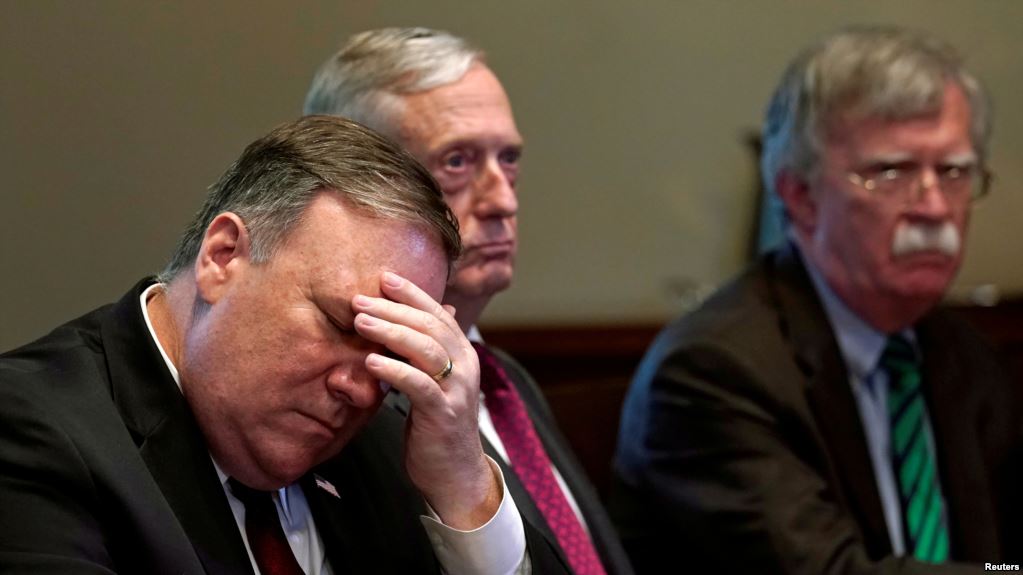Washington’s India confusion
September 3, 2018 | Expert Insights

Ahead of the 2+2 Summit in New Delhi, Pompeo and Mattis will arrive in New Delhi to back President Trump’s unpolished India policy.
President Donald Trump's tendency to mock Prime Minister Narendra Modi's accent in English has also left a bitter taste.
Background
India-U.S. bilateral relations have developed into a "global strategic partnership", based on shared democratic values and increasing convergence of interests on bilateral, regional and global issues. Regular exchange of high-level political visits has provided sustained momentum to bilateral cooperation, while the wide-ranging and ever-expanding dialogue architecture has established a long-term framework for India-U.S. engagement.
Today, the India-U.S. bilateral cooperation is broad-based and multi-sectoral, covering trade and investment, defence and security, education, science and technology, cyber security, high-technology, civil nuclear energy, space technology and applications, clean energy, environment, agriculture and health. Vibrant people-to-people interaction and support across the political spectrum in both countries nurture our bilateral relationship.
Analysis
Among the other challenges are growing trade tensions, US has insisted that India end its huge purchases of Iranian oil. Washington's threats to impose sanctions on India if it continues to purchase Russian military equipment, as India has done for most of its history, is also upsetting New Delhi.
Improving ties with the United States was Mr Modi's signature foreign policy endeavour when he came to power in 2014. However, with New Delhi suddenly uncertain about Washington, Mr Modi has in recent weeks sought to mend ties with Moscow, and with Beijing as a hedge.
For decades, the US hoped that India would become an economic and military counterweight to a resurgent China. Mr Rex Tillerson, the Trump administration's first secretary of state, described his outreach to India as among the most vital initiatives of his tenure, giving a gushing speech last October about the myriad reasons the two countries were natural partners.
Under Mr Mattis, the Pentagon has been equally committed to the partnership. It has even renamed its Hawaii-based US combatant command that oversees the Pacific region as the Indo-Pacific Command as a lure for India to increase its partnership with the US and other allied forces.
India's rise was seen as such an obvious win for the US that previous presidents mostly overlooked New Delhi's reflexive trade protectionism.
A congressional effort to punish Russia has meant that India's plans to purchase a sophisticated air defence system from Moscow - the same one that Turkey is considering buying - could seriously wound ties.
In some ways, Mr Modi and Mr Trump are made for each other. Both are right-of-centre nationalists who are seen by some minorities in each country as intolerant demagogues.
However, a summit between them last November went poorly after Mr Trump criticised Mr Modi over trade issues, particularly India's tariffs on Harley-Davidson motorcycles. Mr Trump's decisions in recent months to impose sanctions on Iran and Turkey had spill-over effects on India, pushing down the value of the rupee.
Despite their differences, President Trump and PM Modi have similar leadership styles. Both have a strong conservative base and have the support of the right-wing.
Key positions at the State Department that deal with India remain vacant, adding to the uncertainty. And this week's meetings were shelved twice before, with many Indians believing that the most recent cancellation was done at Mr Trump's insistence.
Assessment
Our assessment is that President Trump wants India to act more on key regional issues. Additionally, we believe he wants to hihglight India’s role in bringing stability in Afghanistan. India already has spent millions in multiple development projects in the region. However, Trump noted that he expected more. We feel that as China becomes more assertive on its border with India, and ramps up investments in Sri Lanka, the Maldives and Nepal, New Delhi must forcefully counter Beijing. We also feel that Mr Pompeo and Mr Mattis must reassure the India by dismissing Mr Trump's occasional gaffes.








Comments